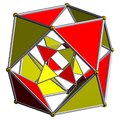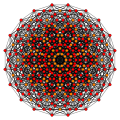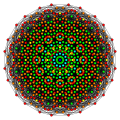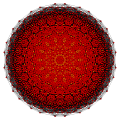 5-cube |
 Runcic 5-cube | ||
 5-demicube |
 Runcicantic 5-cube | ||
| Orthogonal projections in B5 Coxeter plane | |||
|---|---|---|---|
In six-dimensional geometry, a runcic 5-cube or (runcic 5-demicube, runcihalf 5-cube) is a convex uniform 5-polytope. There are 2 runcic forms for the 5-cube. Runcic 5-cubes have half the vertices of runcinated 5-cubes.
Runcic 5-cube
| Runcic 5-cube | |
|---|---|
| Type | uniform 5-polytope |
| Schläfli symbol | h3{4,3,3,3} |
| Coxeter-Dynkin diagram | |
| 4-faces | 42 |
| Cells | 360 |
| Faces | 880 |
| Edges | 720 |
| Vertices | 160 |
| Vertex figure | |
| Coxeter groups | D5, [32,1,1] |
| Properties | convex |
Alternate names
- Cantellated 5-demicube/demipenteract
- Small rhombated hemipenteract (sirhin) (Jonathan Bowers)[1]
Cartesian coordinates
The Cartesian coordinates for the 960 vertices of a runcic 5-cubes centered at the origin are coordinate permutations:
- (±1,±1,±1,±3,±3)
with an odd number of plus signs.
Images
| Coxeter plane | B5 | |
|---|---|---|
| Graph | 
| |
| Dihedral symmetry | [10/2] | |
| Coxeter plane | D5 | D4 |
| Graph | 
|

|
| Dihedral symmetry | [8] | [6] |
| Coxeter plane | D3 | A3 |
| Graph | 
|

|
| Dihedral symmetry | [4] | [4] |
Related polytopes
It has half the vertices of the runcinated 5-cube, as compared here in the B5 Coxeter plane projections:
 Runcic 5-cube |
 Runcinated 5-cube |
| Runcic n-cubes | |||||||||||
|---|---|---|---|---|---|---|---|---|---|---|---|
| n | 4 | 5 | 6 | 7 | 8 | ||||||
| [1+,4,3n-2] = [3,3n-3,1] |
[1+,4,32] = [3,31,1] |
[1+,4,33] = [3,32,1] |
[1+,4,34] = [3,33,1] |
[1+,4,35] = [3,34,1] |
[1+,4,36] = [3,35,1] | ||||||
| Runcic figure |

|

|

|

|

| ||||||
| Coxeter | = |
= |
= |
= |
= | ||||||
| Schläfli | h3{4,32} | h3{4,33} | h3{4,34} | h3{4,35} | h3{4,36} | ||||||
Runcicantic 5-cube
| Runcicantic 5-cube | |
|---|---|
| Type | uniform 5-polytope |
| Schläfli symbol | t0,1,2{3,32,1} h3{4,33} |
| Coxeter-Dynkin diagram | |
| 4-faces | 42 |
| Cells | 360 |
| Faces | 1040 |
| Edges | 1200 |
| Vertices | 480 |
| Vertex figure | |
| Coxeter groups | D5, [32,1,1] |
| Properties | convex |
Alternate names
- Cantitruncated 5-demicube/demipenteract
- Great rhombated hemipenteract (girhin) (Jonathan Bowers)[2]
Cartesian coordinates
The Cartesian coordinates for the 480 vertices of a runcicantic 5-cube centered at the origin are coordinate permutations:
- (±1,±1,±3,±5,±5)
with an odd number of plus signs.
Images
| Coxeter plane | B5 | |
|---|---|---|
| Graph | 
| |
| Dihedral symmetry | [10/2] | |
| Coxeter plane | D5 | D4 |
| Graph | 
|

|
| Dihedral symmetry | [8] | [6] |
| Coxeter plane | D3 | A3 |
| Graph | 
|

|
| Dihedral symmetry | [4] | [4] |
Related polytopes
It has half the vertices of the runcicantellated 5-cube, as compared here in the B5 Coxeter plane projections:
 Runcicantic 5-cube |
 Runcicantellated 5-cube |
Related polytopes
This polytope is based on the 5-demicube, a part of a dimensional family of uniform polytopes called demihypercubes for being alternation of the hypercube family.
There are 23 uniform 5-polytopes that can be constructed from the D5 symmetry of the 5-demicube, of which are unique to this family, and 15 are shared within the 5-cube family.
| D5 polytopes | |||||||||||
|---|---|---|---|---|---|---|---|---|---|---|---|
 h{4,3,3,3} |
 h2{4,3,3,3} |
 h3{4,3,3,3} |
 h4{4,3,3,3} |
 h2,3{4,3,3,3} |
 h2,4{4,3,3,3} |
 h3,4{4,3,3,3} |
 h2,3,4{4,3,3,3} | ||||
Notes
References
- H.S.M. Coxeter:
- H.S.M. Coxeter, Regular Polytopes, 3rd Edition, Dover New York, 1973
- Kaleidoscopes: Selected Writings of H.S.M. Coxeter, edited by F. Arthur Sherk, Peter McMullen, Anthony C. Thompson, Asia Ivic Weiss, Wiley-Interscience Publication, 1995, ISBN 978-0-471-01003-6 [1]
- (Paper 22) H.S.M. Coxeter, Regular and Semi Regular Polytopes I, [Math. Zeit. 46 (1940) 380-407, MR 2,10]
- (Paper 23) H.S.M. Coxeter, Regular and Semi-Regular Polytopes II, [Math. Zeit. 188 (1985) 559-591]
- (Paper 24) H.S.M. Coxeter, Regular and Semi-Regular Polytopes III, [Math. Zeit. 200 (1988) 3-45]
- Norman Johnson Uniform Polytopes, Manuscript (1991)
- N.W. Johnson: The Theory of Uniform Polytopes and Honeycombs, Ph.D.
- Klitzing, Richard. "5D uniform polytopes (polytera)". x3o3o *b3x3o - sirhin, x3x3o *b3x3o - girhin
External links
- Weisstein, Eric W. "Hypercube". MathWorld.
- Polytopes of Various Dimensions
- Multi-dimensional Glossary
